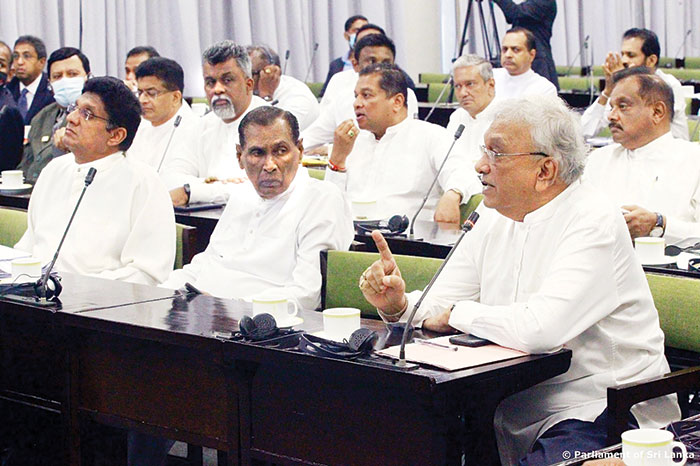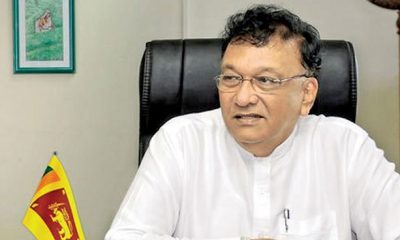News
Change catastrophic strategies or face consequences -CB warns Parliament

By Shamindra Ferdinando
Central Bank Governor Dr. Nandalal Weerasinghe has warned political parties represented in Parliament that unless they abandon their ill-conceived strategies, Sri Lanka would have to seek IMF interventions 16 times in the next 20 years.
Dr. Weerasinghe issued the warning at a meeting organised on the intervention of Speaker Mahinda Yapa Abeywardena at the Parliament, on 31 August. This was ahead of the successful conclusion of the Staff-Level talks with the International Monetary Fund (IMF)for a four-year USD 2.9 bn loan facility.
Dr. Weerasinghe said that over the years Sri Lanka had sought IMF’s intervention on 16 occasions and this was the 17th time.
Pointing out that measures that had been taken by the yahapalana government (2016-2019). following agreement with the IMF, was disregarded by those who regained power in 2019/2020, Dr. Weerasinghe said if the government/Opposition reneged on the undertakings, the country would face a similar crisis, in three years.
Dr. Weerasinghe chided political parties for seeking political gains at the expense of the national economy. The government and the Opposition and vice versa repeatedly, made election promises that undermined the national economy, Dr. Weerasinghe said. Those who voted for them ultimately paid a very heavy price, Dr. Weerasinghe added.
Top Central Banker Dr. Weerasinghe, who retired in January 2021, was requested by former President Gotabaya Rajapaksa to succeed Ajith Nivard Cabraal as its Governor in April this year.
Dr. Weerasinghe said that those who obtained IMF assistance promising to rectify their wrongdoings, but continued to do the same.
At the onset of his one-hour long speech, Dr. Weerasinghe, having declared that the situation was so bad the current crisis could be compared with that of Zimbabwe and Lebanon. The CBSL Chief stressed that the per capita income in USD terms had dropped from USD 4,000 to 3,200. Unless tangible measures were taken, the economy could collapse, Dr. Weerasinghe warned, while advising lawmakers how hyperinflation could cause the government to lose control.
Dr. Weerasinghe alleged reckless and irresponsible spending by successive governments against the backdrop of year on year widening budget deficit led to the current crisis. The governments deprived the private sector of the much required funding for investment purposes etc., by utilizing such funds, he said.
The CBSL Chief showed how Parliament repeatedly raised the ceiling on borrowings to facilitate the agendas of the ruling party whoever was at the helm at that time.
Commenting on rapid deterioration of the economy, Dr. Weerasinghe pointed out large scale commercial borrowings that began in 2005 as against concessionary loans secured earlier undermined the very basis of the economy. Imprudent investments of such commercial loans contributed to the current catastrophe, Dr. Weerasinghe said, asserting that commercial borrowings had reached a critical level.
Declaring that he wasn’t making a political statement, Dr. Weerasinghe explained how the Mahaweli project contributed to Sri Lanka’s development, especially saved valuable foreign exchange by enhancing hydro-power generation capacity. Otherwise, Sri Lanka would have been in deeper trouble, Dr. Weerasinghe said, finding fault with successive governments for procuring loans at higher interest rates to further expand the public sector, pay salaries and pensions and other non- productive measures.
Dr. Weerasinghe said that those who had been in power simply secured loans from those ready to give. The reckless project continued as long as Sri Lanka had access to financial markets, Dr. Weerasinghe said, adding that this was interrupted in 2020/2021 when the country lost access to such markets. Dr. Weerasinghe declared that the moment creditors stopped giving us more loans we were bankrupt.
Referring to recurring losses suffered by state enterprises, Dr. Weerasinghe disclosed State Corporation sustained losses amounting to Rs 1 trillion. Addressing Power and Energy Minister Kanchana Wijesekera who was among those present on the occasion, Dr. Weerasinghe said that the lawmaker knew the extreme difficulties in managing the crisis.
Dr. Weerasinghe slammed the previous government for abolishing a range of taxes in the absence of a public campaign. That triggered the unprecedented crisis, Dr. Weerasinghe said, acknowledging Central Banks world over printed money as a temporary measure as happened during the Covid-19 pandemic. However, Sri Lanka continued the practice, the CBSL chief said, comparing the actions of the then government to a person who didn’t want to give up the use of ‘abing’ (opium).
Dr. Weerasinghe said that at the time he took over the Central Bank in April this year, both Bank of Ceylon and People’s Bank had defaulted. The reserves in April amounted to just USD 20 mn and the economy was in tatters, Dr. Weerasinghe said.
Commenting on his immediate predecessor Ajith Nivard Cabraal’s much touted road-map meant for economic recovery didn’t yield expected results. In spite of projected USD 10 bn in terms of fresh funding there was absolutely nothing, Dr. Weerasinghe declared.
The CB Governor strongly defended the declaration he made as regards Sri Lanka’s failure to meet its loan obligations. The declaration was made in the wake of the IMF turning down Sri Lanka’s request for USD 800 mn which was made available due to covid. Sri Lanka was denied that on the basis the country couldn’t have repaid that facility provided to all countries affected by covid-19.
Then having squandered precious USD by fixing Rs at 203 to the dollar, the currency was floated without following proper procedures. That was nothing but a disastrous measure that finally led to street protests and the change of government. Emphasizing the responsibility on the part of the incumbent government to ensure strict implementation of measures currently in place to control expenditure by imposing import restrictions, Dr. Weerasinghe warned that unless the government achieved that there would be a change of government again.
Acknowledging the extreme difficulties experienced by fixed income earners and the poor, Dr. Weerasinghe underscored the pivotal importance of what he called a social security safety net. The IMF expected the government to pay attention to the issue at hand as whatever the proposed reforms they couldn’t be sustained unless the administration looked after those vulnerable groups. If those unable to make ends meet come onto the streets, there would be a bloodbath. Such a scenario would be far more dangerous than the Galle Face protest campaign that forced the change of government in July, Dr. Weerasinghe said.
The CBSL Chief said that he was also concerned about the sustainability of the banking sector. The outspoken official pointed out that with food inflation at over 90 percent sustaining the economic reforms and taking forward the staff level agreement with the IMF to the next level would be a challenge.
News
US sports envoys to Lanka to champion youth development

The U.S. Embassy in Colombo welcomed the U.S. Sports Envoys to Sri Lanka, former National Basketball Association (NBA) and Women’s National Basketball Association (WNBA) players Stephen Howard and Astou Ndiaye, from June 8 through 14.
The Public Diplomacy section of the U.S. Embassy said that it would launch a weeklong basketball program intended to harness the unifying power of sports, made possible through collaboration with Foundation of Goodness and IImpact Hoop Lab.
While in Sri Lanka, Howard and Ndiaye, both retired professional basketball players, will conduct a weeklong program, Hoops for Hope: Bridging Borders through Basketball. The Sports Envoys will lead basketball clinics and exhibition matches and engage in leadership sessions in Colombo and Southern Province for youth aged 14-18 from Northern, Uva, Eastern and Western Provinces, offering skills and leadership training both on and off the court. The U.S. Envoys will also share their expertise with the Sri Lanka Basketball Federation, national coaches, and players, furthering the development of basketball in the country. Beyond the clinics, they will collaborate with Sri Lankan schoolchildren to take part in a community service project in the Colombo area.
“We are so proud to welcome Stephen and Astou as our Sports Envoys to Sri Lanka, to build on the strong people-to-people connections between the United States and Sri Lanka,” said U.S. Ambassador Julie Chung. “The lessons that will be shared by our Sports Envoys – communication, teamwork, resilience, inclusion, and conflict resolution – are essential for leadership development, community building, equality, and peace. The U.S. Sports Envoy program is a testament to our belief that sports can be a powerful tool in promoting peace and unity.”
News
Rahuman questions sudden cancellation of leave of CEB employees

SJB Colombo District MP Mujibur Rahuman in parliament demanded to know from the government the reasons for CEB suspending the leave of all its employees until further notice from Thursday.
MP Rahuman said that the CEB has got an acting General Manager anew and the latter yesterday morning issued a circular suspending leave of all CEB employees with immediate effect until further notice.
“We demand that Minister Kanchana Wijesekera should explain this to the House. This circular was issued while this debate on the new Electricity Amendment Bill was pending. There are many who oppose this Bill. The Minister must tell parliament the reason for the urge to cancel the leave of CEB employees,” the MP said.However, Speaker Mahinda Yapa Abeywardena prevented Minister Wijesekera responding to the query and said that the matter raised by MP Rahuman was not relevant.
News
CIPM successfully concludes 8th Annual Symposium

The Chartered Institute of Personnel Management (CIPM) successfully concluded the 8th Annual CIPM Symposium, which took place on 31st May 2024. Themed “Nurturing the Human Element—Redefining HRM in a Rapidly Changing World,” the symposium underscored the pivotal role of human resource management (HRM) in today’s dynamic global landscape. Since its inception in 1959, CIPM has been dedicated to advancing the HR profession through education, professional development, and advocacy, solidifying its position as Sri Lanka’s leading professional body for HRM.
Ken Vijayakumar, the President of the CIPM, graced the occasion as the chief guest. The symposium commenced with the welcome address by the Chairperson, Prof. Arosha Adikaram, followed by the Web Launch of the Symposium Proceedings and Abstract Book by the CIPM President. The event featured distinguished addresses, including a speech by Chief Guest Ken Vijayakumar, President of CIPM, and an address by Guest of Honor Shakthi Ranatunga, Chief Operating Officer of MAS Holdings Pvt. Ltd., Sri Lanka.
The symposium also featured an inspiring keynote address by Prof. Mario Fernando, Professor of Management and Director of the Centre for Cross Cultural Management (CCCM) at the University of Wollongong, Australia.
Vote of Thanks of the inauguration session was delivered by Dr. Dillanjani Weeratunga, Symposium Co-chair.
The symposium served as a comprehensive platform for researchers to present their findings across a wide range of critical topics in HRM. These included Cultural Diversity and Inclusion, Talent Development and Retention, Ethical Leadership and Corporate Social Responsibility, Adapting to Technological Advancements, Mental Health and Well-being at Work, Global Workforce Challenges, Employee Empowerment, and Reskilling and Upskilling.
The plenary session was led by Prof. Wasantha Rajapakse. Certificates were awarded to the best paper presenters during the valedictory session, followed by a vote of thanks delivered by Kamani Perera, Manager of Research and Development.
The annual symposium of CIPM was a truly inclusive event, attracting a diverse audience that spanned undergraduates, graduates, working professionals, research scholars and lecturers. This widespread interest highlights the symposium’s significance in the field of HRM, offering a unique opportunity for everyone to network and learn from scholarly brains.The CIPM International Research Symposium was sponsored by Hambantota International Port, Sri Lanka Institute of Information Technology (SLIIT), E B Creasy & Co. PLC, and Print Xcel Company.
















